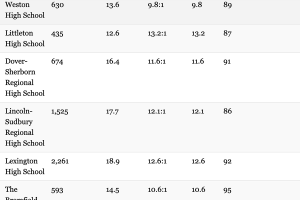Massachusetts Legislature Passes Bilingual Education Bill
The State House and Senate overwhelmingly supported a measure to help students who are English language learners.

Photo via iStock.com/billnoll
Significant achievement gaps plague students who are not native English speakers in Massachusetts, but a new bipartisan bill seeks to change that.
The LOOK bill allows local schools to tailor bilingual lesson plans for the more than 90,000 students in Massachusetts who are not fluent in English and are referred to as English language learners, or ELL students. The legislation was passed unanimously by the Senate and opposed by just one member of the House on Wednesday night. Current policy, dictated by a 2002 ballot measure, stipulates that non-native speakers be taught almost entirely in English. The new legislation softens this one-size-fits-all approach, giving educators more flexibility, including teaching in a students’ native language.
The most recent MCAS data shows just 20 percent of ELL students met or exceeded expectations statewide. On top of that, despite representing roughly 6 percent of the state’s student population, nearly one in five dropouts in Massachusetts are ELL students. And state data shows just 64 percent of these students graduate from high school within four years, as compared to a statewide graduation rate of nearly 88 percent.
Several state senators and representatives praised the bill, which will affect roughly 9.5 percent of the student population in Massachusetts. Student-centered, individualized learning is a hallmark of contemporary education thought leaders, and the bill’s less stringent standards poise Massachusetts law to be in step with such a mindset.
“Every student has unique needs, and it is our obligation to foster an environment where they are afforded an education tailored to them,” House Speaker Robert DeLeo said in a statement. “Massachusetts’ education system is the best in the nation, and I believe that this legislation will enhance our standing while ensuring that education is, indeed, the great equalizer.”
The number of ELL students in Massachusetts has nearly doubled since 2000, according to a press release. The new legislation recognizes that diversity and works to remove language efficiency as a barrier to success.
“We live in a global community and we must be able to adapt to the changing needs of our communities in a thoughtful and constructive way,” Senate President Stan Rosenberg said in a statement.
The bill will make its way to Gov. Charlie Baker’s desk next.

